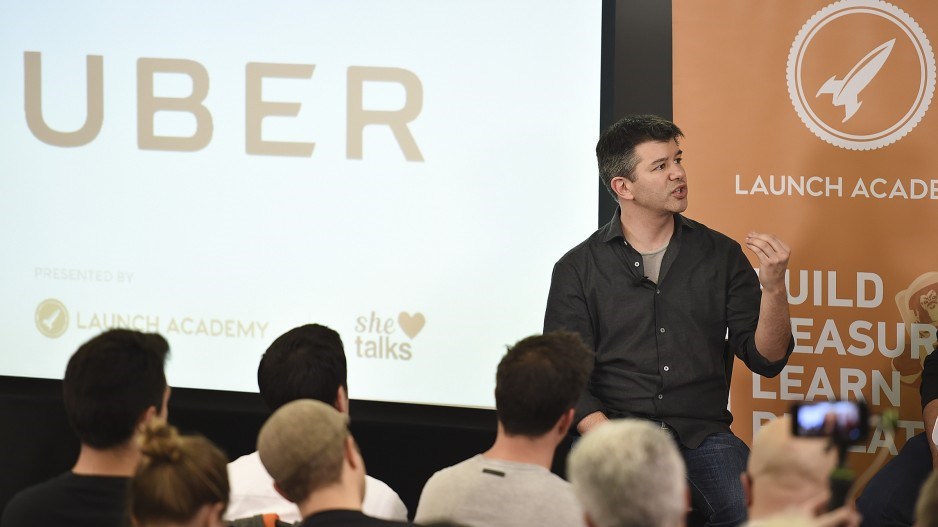The CEO of Uber says his ride-sharing service isn’t looking to break any rules when it returns to Vancouver one day.
But that doesn’t mean some rules can’t be bent.
Travis Kalanick laid out a hypothetical pitch to the B.C. government while speaking at a fireside chat February 15 at the Launch Academy incubator in downtown Vancouver.
“If you want to create jobs, if you don’t like traffic, if you don’t like drunk driving, if you don’t like pollution, then I think Uber’s a good solution for Vancouver,” the CEO told the crowd of about 150 tech workers attending a panel moderated by Launch Academy CEO Ray Walia and She Talks co-founder Barinder Rasode.
He said the taxi industry across different jurisdictions represents a “monopolistic, regulated cartel” that takes advantage of both consumers and drivers.
“Systems that prevent competition and prevent progress have to be changed,” he said.
“There are new rules that need to bend towards progress for the people and I believe that eventually Vancouver will make that move.”
But the San Francisco-based tech startup’s efforts to launch a ride-sharing service in Vancouver have been stymied by the city and the province.
Uber operated in Vancouver briefly in 2012, allowing consumers to use its mobile app to order rides from private drivers.
It soon pulled out of the city once the B.C. government’s Passenger Transportation Board determined the company was operating as a limo service and was required to fall in line with regulations covering that industry, such as charging a minimum of $75 per ride.
In 2014, Vancouver’s cab companies launched a lawsuit seeking an injunction against Uber to prevent it from returning to and operating within city limits.
Uber has also been plagued by controversies abroad, including allegations a male driver raped a female passenger in India last year. And in 2013, an Uber driver ran over a six-year-old girl, killing her on New Year's Eve.
Kalanick, who declined to take questions from the media, told the crowd that whatever bad press the company has faced doesn’t reflect what people in society think about the service.
“It’s surprising to us. We thought there’d be a lot of issues. There just hasn’t been,” he said.
Kalanick’s statements about the potential for his company to re-enter the market in B.C. echoed those made by Uber’s chief adviser, David Plouffe, when he spoke to the Vancouver Board of Trade last September.
“We’re eager to engage with local government, provincial government to find a way forward so that we can bring rideshare here,” said Plouffe, who was previously a senior adviser to U.S. President Barack Obama.
Last month, B.C. Transportation Minister Todd Stone told reporters it’s only a matter of time before ride-sharing services like Uber settle into B.C. and operate side-by-side with taxi companies.
No timeline is in place for Uber to return to Vancouver.
But Peter Fassbender, the provincial minister overseeing TransLink, began talking with stakeholders in late January about the introduction of ride-sharing services across municipalities.
Kalanick said during the fireside chat that he doesn’t believe taxi drivers are bad people but that they are treated badly by the industry they work in due to the high prices of taxi licences.
“It not only screws over choice for the consumer but it also screws over choice for the driver,” he said, adding the introduction of Uber would create “tens of thousands of jobs in the city inside of 18 months.”
Vancouver city Coun. Geoff Meggs said Uber isn’t really promising jobs with benefits, but an opportunity to earn some additional income.
I’m certain that there will be tremendous job loss among taxi drivers even if many of them go over to Uber. But that’s not a gain,” he said.
“We should develop a framework for ride-share, but I don’t think that means we allow a single multi-national to come in and drain revenue out of local transportation.”
Although Kalanick was in town to appear at the TED Talks conference, Meggs said Uber has not reached out to the city since last fall.
“They’re focusing on the province of B.C., which has to create a regime at the Passenger Transportation Board level. It’s not about the City of Vancouver,” he said.
“The provincial framework has to be established by Victoria and they’ve spectacularly failed at their efforts so far.”




